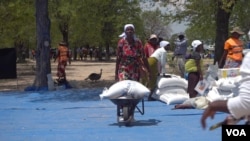A top USAID official in Zimbabwe says the agency will continue providing aid to people of the southern African nation, despite Harare summoning the top U.S. diplomat in the country.
The government called in Elaine French, chargé d'affaires at the U.S. Embassy in Harare, on Tuesday to protest advertisements posted on social media urging citizens to vote and cast their ballots peacefully. A Zimbabwean official said the ads bordered on illegal activism.
Ramses Gauthier, the chargé d'affaires at the U.S. Agency for International Development in Zimbabwe, said his organization will not stop aiding people in the country despite the government's actions.
"Our commitment is toward Zimbabwean people, and it's a longstanding one," Gauthier said. "We have been standing by the Zimbabwean people since 1980, and we have invested billions of dollars. We may have disagreements, but we are not enemies, and Zimbabwean people are our friends. So, whatever we do, we do it with a sentiment of friendship toward the Zimbabwean people. And disagreement or not, we will continue to stand by the Zimbabwean people."
Late Tuesday, Zimbabwe's acting secretary for foreign affairs, Rofina Chikava, summoned French to protest several advertisements shared on social media this month by the U.S. Embassy.
Foreign Affairs Ministry spokesman Livit Mugejo singled out one Twitter message that said, "Register to vote and make sure your voice is heard."
Mugejo said that in the meeting with French, Chikava expressed concern that the social media posts bordered "on activism and meddling in Zimbabwe's internal affairs" and were unacceptable, as they deviated from conventional diplomatic norms.
Meg Riggs, the spokeswoman for the U S. Embassy, defended the ads.
"We stand by our recent social media posts calling for peace during the election season. These neutral apolitical messages feature the work of Zimbabwean artists who wanted to engage their fellow youths on the importance of peace during an electoral process," Riggs said. "Elections are a fundamental part of a functioning democracy. All Zimbabweans deserve this chance to choose their future safely."
Riggs added that the United States does not back any political candidate or party in Zimbabwe, but strongly supports a peaceful and transparent election process "that reflects the will of the people of Zimbabwe."
Alexander Rusero, who heads the International Relations Studies Department at Africa University in Zimbabwe, said President Emmerson Mnangagwa was justified in summoning the U.S. diplomat.
"At times, the United States of America and its embassy, they should desist from acting as if they are political actors," Rusero said. "There is need for rationality in handling Zimbabwe issues, because what the United States did in terms of that tweet, it's outside the parameters of what diplomacy and diplomats should do."
But Lovemore Madhuku, a law professor at the University of Zimbabwe, disagreed.
"The U.S. Embassy, whatever it is doing, cannot be said to be a serious interference with the electoral processes," Madhuku said. "There is a lot of misunderstanding of the role of foreign embassies. If they encourage people to register to vote or encourage people to vote without saying, 'Vote for so and so,' it cannot be wrong."
Madhuku said there is no reason Zimbabwe's government should be uncomfortable with an open electoral playing field.




